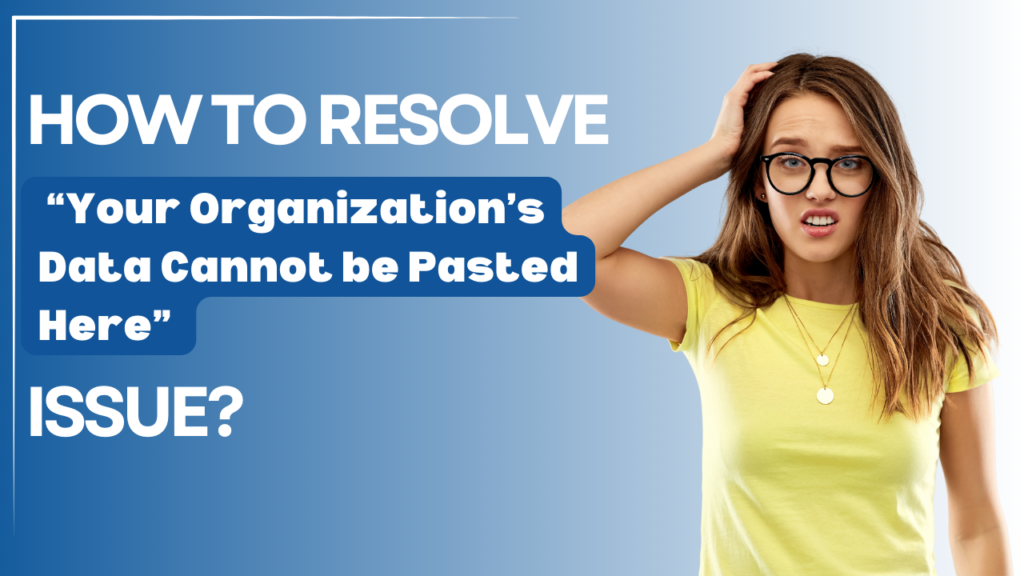The phrase “your organization’s data cannot be pasted here.” refers to restrictions on sharing sensitive information. It highlights the importance of maintaining confidentiality and ensuring that certain data remains within secure environments. This message often appears in digital platforms, reminding users that they must not share or copy sensitive information outside authorized applications. Such precautions prevent unauthorized access and potential data breaches.
Table of Contents
Understanding this message is crucial for employees in any your organization’s data cannot be pasted here. It emphasizes the need to be vigilant about data security practices. Organizations implement these restrictions to protect valuable information from falling into the wrong hands. It ensures compliance with data protection regulations and builds trust with clients and stakeholders.
The Importance of your organization’s data cannot be pasted here.
Data protection is vital for any your organization’s data cannot be pasted here. in today’s digital landscape. Organizations collect and store sensitive information, such as personal data, financial records, and trade secrets. Safeguarding this information is essential to prevent identity theft, fraud, and other malicious activities. When organizations prioritize data protection, they not only shield their assets but also reinforce their reputation and credibility.
Moreover, data protection fosters customer trust. Clients are more likely to engage with your organization’s data cannot be pasted here. that demonstrate a commitment to securing their information. Implementing robust data protection strategies can enhance customer loyalty and satisfaction. By showing dedication to data security, organizations can build lasting relationships with clients, creating a competitive advantage in the market.
Common Scenarios Where Data Restrictions Apply
your organization’s data cannot be pasted here. often encounter various scenarios where data restrictions are crucial. For instance, when employees are working on sensitive projects, such as product development or strategic planning, sharing details outside the team can lead to leaks. To mitigate risks, organizations enforce policies that restrict data sharing and require users to adhere to specific protocols.
Another common scenario is in the case of client information. When dealing with customer data, your organization’s data cannot be pasted here. must follow privacy laws and regulations. This means ensuring that any data shared externally is either anonymized or has explicit consent from the client. Such precautions help prevent legal consequences and uphold the organization’s reputation in the industry.
How to Communicate Data Privacy Policies Effectively
Effective communication of data privacy policies is essential for fostering a culture of security within an your organization’s data cannot be pasted here. It is important to present these policies in a clear and straightforward manner, avoiding complex jargon that might confuse employees. Providing training sessions and workshops can help ensure that everyone understands the importance of data protection and the specific policies in place.
Additionally, your organization’s data cannot be pasted here. should consider using visual aids, such as infographics or posters, to reinforce key messages about data privacy. Regular reminders through emails or internal newsletters can keep data protection top of mind for employees. By actively engaging staff in conversations about data privacy, organizations can create a sense of ownership and responsibility regarding safeguarding sensitive information.
Best Practices for Handling Sensitive Data
Handling sensitive data requires careful consideration and adherence to best practices. First, organizations should implement access controls to limit who can view and edit sensitive information. By granting permissions based on roles, organizations can minimize the risk of data exposure. Additionally, utilizing encryption methods can help protect data at rest and in transit, ensuring that unauthorized individuals cannot access it.
Regular audits and assessments are also crucial for maintaining data security. Organizations should conduct routine checks to identify vulnerabilities in their data handling processes. This proactive approach allows them to address potential risks before they escalate into serious breaches. By following these best practices, organizations can establish a robust framework for managing sensitive data securely.
Legal Implications of Data Breaches and Non-Compliance
Data breaches can have severe legal implications for organizations. In many jurisdictions, laws such as the General Data Protection Regulation (GDPR) and the California Consumer Privacy Act (CCPA) impose strict requirements on how organizations handle personal data. Failure to comply with these regulations can result in hefty fines and legal action against the organization.
Additionally, organizations may face reputational damage following a data breach. Trust, once lost, can be difficult to regain. Customers may choose to take their business elsewhere if they feel their information is not secure. Therefore, organizations must prioritize compliance with data protection laws and implement strategies to mitigate the risk of breaches.
Conclusion
In conclusion, ensuring data security in your organization is paramount. Understanding the phrase “your organization’s data cannot be pasted here.” underscores the importance of protecting sensitive information. By recognizing the significance of data privacy, organizations can foster a culture of security and compliance among employees.
Implementing effective data protection policies, communicating these policies clearly, and adhering to best practices can help organizations safeguard their valuable information. As data breaches continue to pose risks, prioritizing data security is not just a legal obligation but also a vital aspect of maintaining customer trust and organizational integrity.
Read More conor pewarski
